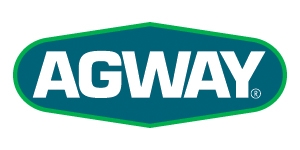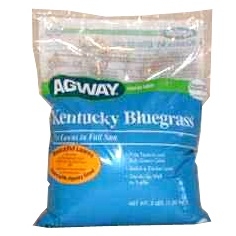Agway Kentucky Bluegrass Grass Seed Blend 3lb
Description
Agway Kentucky Bluegrass is a blend of three different bluegrass varieties.
Agway ® Kentucky Bluegrass
Agway Kentucky Bluegrass is a blend of three different bluegrass varieties. Fine texture and rich green color. Builds a thicker lawn. Stands up well to traffic. 3 lbs covers up to 1,200 sq.ft for new lawns and 2,400 sq.ft for overseeding*.
Kentucky Bluegrass is an AGWAY Value Blend suited for lawn seeding projects. Kentucky Bluegrass adapts easily and covers quickly in a wide range of growing sites and thrives under cool temperatures.
Establish Your Lawn the Right Way
The Best Time to Plant:
Spring and fall are the best planting times. Grass seed germinates well when the soil is warm (60-80º F) and showers are frequent.
Prepare the Soil:
New Lawn:
Use a tiller to loosen top 2”-3” of soil in areas to be seeded. Level any uneven soil and rake to create shallow furrows.
Overseeding an Existing Lawn:
Start by mowing the existing lawn as short as possible. Then use a vertical mower, dethatcher or, in small areas, a garden rake to break up the soil surface ¼” and make shallow grooves or furrows. Rake out any excess debris and level uneven soil.
Test the Soil:
Determine if lime is needed by testing the soil pH level. Lawn grasses grow best when the soil pH range is 6.5 to 7. When needed, use Agway Pelletized Lime to raise the soil pH. Apply the recommended amount in a fertilizer spreader. Without a soil test, apply 40-50 lbs of lime per 1,000 sq.ft. before seeding.
Fertilize the New Lawn:
Apply AGWAY Greenlawn Lawn Starter for best results when seeding. This specialty fertilizer contains a high level of phosphorus for extensive rooting and a steady supply of nitrogen for rich green color. Follow label directions for spreader settings and recommended amounts.
Sow the Seed:
Use a seeder or spreader to sow the grass seed evenly. Apply ½ the recommended amount (per chart below) in one direction. Then apply the remaining grass seed in a direction 90º from the first (see package diagram). Gently rake seeded area so 1/8” – 1/4” soil covers seed.
| SPREADER | NEW SEEDING | OVER SEEDING |
|
Agway Drop 530 / 75362 |
8.5 |
7.5 |
|
Agway Broadcast 540 / 75462 |
5 |
4 |
|
Agway Broadcast 545 / 75550 |
4 |
2.5 |
|
Scotts AccuGreen® 730 |
5 |
3.75 |
|
Scotts SpeedyGreen® 740 |
4.5 |
3.5 |
|
Earthway Broadcast 2100 |
18 |
13 |
Water, Water, Water:
Cover seeded area(s) with weed-free straw to retain moisture and keep seed from blowing or washing away (a bale usually covers 500 sq.ft.). Use a sprinkler to gently water seeded area(s) frequently and deeply. Never allow seeding to dry out!
When to Mow:
Begin mowing when the grass has grown 1” or taller than the desired mowing height, usually more than 4 weeks after seeding. Most grasses are best when kept 1.5” – 2.5” tall. Sharpen mower blades so they cut cleanly without pulling up newly rooted grass.
Agway Guarantees Satisfaction!
*Seeding Rates based on established University and Industry recommendations and guidelines.
Rates
Please contact us for current pricing and availability.

